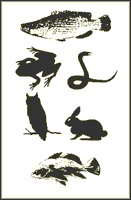Nebraska Cooperative Fish and Wildlife Research Unit

Nebraska Cooperative Fish and Wildlife Research Unit: Staff Publications
Date of this Version
2006
Abstract
Avian life history theory has long assumed that nest predation plays a minor role in shaping reproductive strategies. Yet, this assumption remains conspicuously untested by broad experiments that alter environmental risk of nest predation, despite the fact that nest predation is a major source of reproductive failure. Here, we examined whether parents can assess experimentally reduced nest predation risk and alter their reproductive strategies. We experimentally reduced nest predation risk and show that in safer environments parents increased investment in young through increased egg size, clutch mass, and the rate they fed nestlings. Parents also increased investment in female condition by increasing the rates that males fed incubating females at the nest, and decreasing the time that females spent incubating. These results demonstrate that birds can assess nest predation risk at large and that nest predation plays a key role in the expression of avian reproductive strategies.


Comments
Published in Ecology Letters, (2006) 9: 428–434